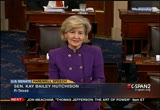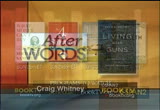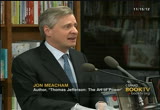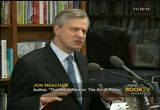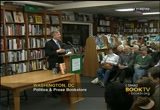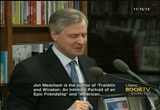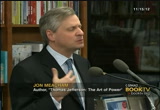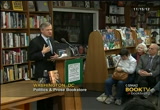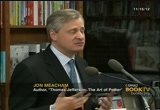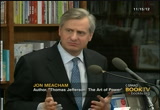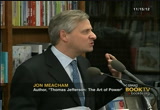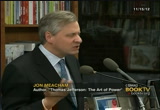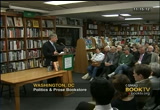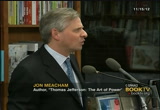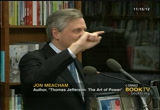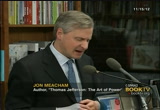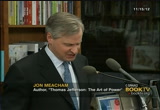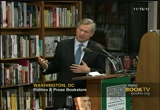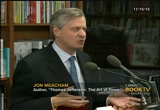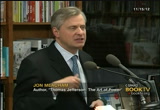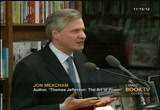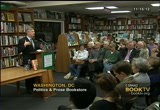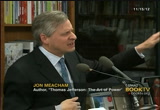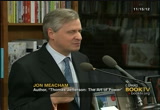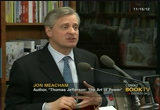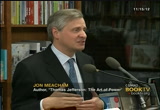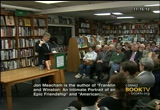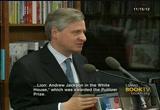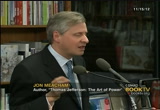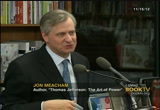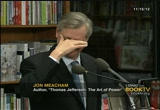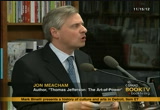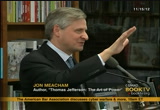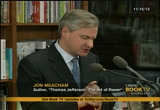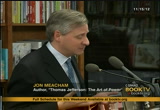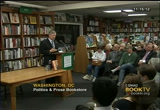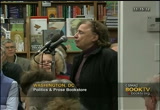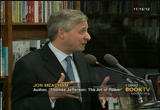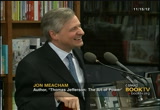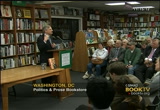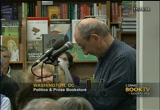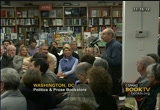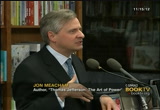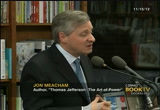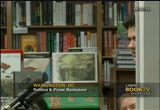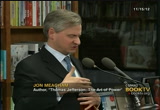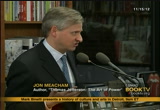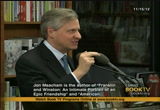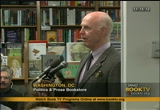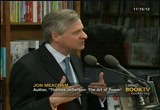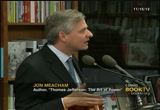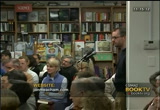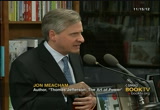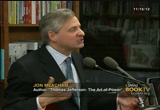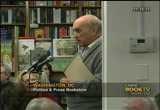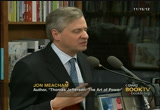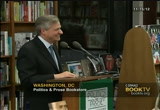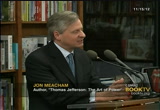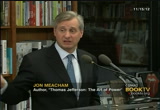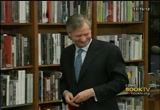tv Book TV CSPAN December 22, 2012 8:00am-9:00am EST
8:00 am
on earth will be protected so that future generations will have the same opportunities that we have had in this great country and that our forebears' sacrificed so much to assure that we get. thank you, madam president and i yield. .. >> at 9 p.m., craig whitney sits down with the former president of the brady campaign to prevent gun violence to discuss the book, "living with guns: a liberal's case for the second amendment." watch these programs and more
8:01 am
all weekend long on booktv, and for a complete schedule visit booktv.org. >> author jon meacham recount it is career of america's third president d recounts the career of america's third president, thomas jefferson. he reports that despite his strong beliefs and opposition to confrontation, president jefferson was able so successfully lead the country in a highly partisan political environment. this is just under an hour. [applause] >> it's all downhill from there. [laughter] my lawyer will take any complaints later. thank you so much, and thank you to what, for what you all do here. i am a, i shopped here as a young washington monthly editor. shopped is too strong. we didn't have any money. as you all may remember, washington monthly editors were paid $10,000 a year which, as
8:02 am
kate boo -- who won the national book award last night adding to her amazing list of of accomplishments -- kate used to say she knew she had actually graduated from the monthly when she could buy entrees as well as appetizers in restaurants. so i never actually spent money here, but i'll try to fix that. i am enormously grateful. i am a southerner, i'm from tennessee and think that understanding jeffson in his regional context as well as his national context and his political context is hugely important. he was a master of politics whether it was idealogically driven or geographically driven, and i think there's something resonant about a ferociously-divided atmosphere, big issues at stake and a president who's tall, cool,
8:03 am
cerebral, pretty good at politics but doesn't like to admit it having to govern in a frack white house atmosphere. there is something that seems familiar about that. [laughter] so i want to do two quick stories about jefferson to give you two sides of him very quickly. matthew davis, a office seeker from new york, goes to monticello trying to get an appointment. he was, would have fit right in this city even now. travels to lobby for the job. he was a burr loyalist. jefferson, not so much. one of the things i say to my hamill tone yang guys is at least my guy didn't get shot in jersey. [laughter] so, and of all the founders, the most likely to have sent shirtless e-mails is alexander hamilton. [laughter] want to get that on the record, and then we'll move on.
8:04 am
matthew davis is sitting there pleading his case, and jefferson's looking sort of -- listening in that vaguely charming way he had. you could leave, and everyone who left his company thought he agrueled with them which was -- agreed with them which was a wonderful way to get through the moment, not such a agreement way to get through the day. and there's a fly buzzing around. and jefferson's nodding and nodding and is in eye contact with davis and goes -- grabs the fly and begins pulling it apart. [laughter] davis begins to realize this payment work out quite as well -- this may not work out quite as well as he hoped. second story. so there you have the man who can snap a fly, pull it apart and ferociously focused when he needs to be, often making you think he's not focused. he traveled through a couple of days' ride from monticello to washington. he stopped at an inn, he falls
8:05 am
into conversation with a fellow guest at the inn, and they have a lovely, wide-ranging discussion. the next morning the other guest, mr. jefferson's up and out, the other guest had never caught his name, and he said to the innkeeper, who was that? and the innkeeper said, well, who did you think it was? he said, for a while -- he knew so much about medicine, i thought he was a doctor. and then we talked about theology, he seemed like he might be a preels, though kind of a shaky one -- [laughter] i thought he could probably a farmer. and the innkeeper said, well, i thought you knew it was mr. jefferson. he was a master, and he was endlessly curious at a time when curiosity and the ability to allow reason to lead us to our own destiny to fulfill our greatest potentials to discover,
8:06 am
to explore was new in the world. and this was the enlightenment era. the scientific revolution had been the day before yesterday. for the first time ever, priestly and princely authority was in the dock, and jefferson was there to reap the harvest of that shift, that fundamental shift and was able to take the intellectual life, the intellectual breakthroughs of the enlightenment both in europe and in scotland and apply them in many ways to american politics. self-government was only going to work in jefferson's mind if the people who were governing themselves knew themselves, cared about each other -- because why would you sacrifice for someone with whom you had no common interest, and you would find that your individual rights, your individual being had come from nature or from god and, therefore, could not be taken away by the hand of a king or the hands of a mob. and this is the moment he
8:07 am
defines, he embodies. it's a remarkable moment. it was blissed to be alive in that very hour, humanly important. so here you have jefferson who can kill a fly when he needs to and can think in the most fundamental, far-reaching ways when he needs to. one hell of a combination. one hell of a combination. what i wanted to do in revisiting jefferson, obviously, was try to restore him to his context as a politician. partly because i think politics gets too bad a rap these days. it may deserve a semi-bad rap. i don't want to be overly optimistic about this. but we don't really have any other way to govern ourselves, and until we find something and we haven't found anything since the first gathering of the cavemen on the savannah who were trying to figure out how not to throw rocks at each other, politics is all we've got to
8:08 am
work out our common interests and to try to move forward together. so even if jefferson, someone who wanted to be remembered reme author of the independence, the author of the statute for religious liberty in liberty and the founder of the university of virginia, he wanted us to remember him for his great ideas. it is one of the great acts of misdirection in american history. he sent us off to a place where posterity would focus on equality, liberty and enlightenment. hard to argue about those things. those are pretty good things. he didn't mention that for 40 years from the time he was 25 until he was about 65, from 1769 til 1809, he was constantly in public office or thinking about getting back into public office.
8:09 am
i don't think that's a bad thing. one of my many character flaws is that i like politicians. i think it -- i'm working on it. [laughter] my name is jon, and i have a, have a problem. [laughter] but i admire men and women who get into the arena and try to make things better and, no, they're not all in it for the purest of motives, but i'm not sure my motives are all that pure all the time either. so if we try to look back and expect the people we think about and talk about to be totally perfect or we're not going to think about them or we're just going to demonize them or denounce them, then we're going to foreclose the possibility of learning from the past. and i don't know about you all, but i learn a lot more from sinners than i do from saints. and thomas jefferson was showerly a sinner. and -- surely a sinner.
8:10 am
and his ability to master his, the best part of his political being, his ability to charm, to make people fall in love with him without knowing why which is one definition of charm, he once went to -- was in the drawing room of margaret bayard smith's -- wonderful early chronicler of washington -- and she missed his name as he came in. and she'd come from a federalist family that thought jefferson was the devil incarnate. and so she's sitting there and finds herself falling in love with this very charming man whose eyes were alternately described as brown, blue and gray. people couldn't even describe how his eyes were. he was charming and gracious and funny and witty and totally beguiling. and her husband, who was the head of the national intelligence, comes in and says, oh, mr. jefferson, i'm sorry i'm late. and margaret bayard smith's head
8:11 am
explodes because she just found him to be the most gracious man she'd ever metment -- met. he could disarm you that way. there is something poetic in the fact that william jefferson clinton is william jefferson clinton. [laughter] by the way, president clinton is still campaigning somewhere. [laughter] i don't know how anyone's going to tell him we voted. maybe he's already starting on the next one. i want to talk a little bit, we -- jefferson, the politician, jefferson, the renaissance man, jeff the symbol -- jefferson, the symbol, you know, secessionists wanted a piece of him in the run-up to the civil war, frank lib roosevelt -- franklin roosevelt wanted him in the runup to world war ii. he can be used in any way you need partly because he was so articulate and so prolific.
8:12 am
20,000 or more letters, brilliantly written, wonderfully eloquent. so what can we make of him? this is, this ises the man, the human being we have, you know, and that's what i always want to get to. answering president kennedy's question, what was he like. in the service of trying to figure this out, i asked for and was granted permission to sleep in jefferson's bedroom one night on a pallet on the floor, i hasten to add. [laughter] and wanted to hear how the clock sounded. jefferson always said he woke when he could start to make out the hands of the clock. and the sun had not caught me in belled in more than 40 years. and i -- in bed in more than 40 years. as dean acheson once said, no one comes out second best in their memoir, whether that was actually true.
8:13 am
[laughter] a brilliant point from secretary acheson, by the way. and what i learned there was as the sun rises over the swen mountains in virginia, the first place the light hits is his bed. he designed the house so that he would be able to begin to absorb the light, begin the day, enter the journey as soon as it was physically and humanly and naturally possible. later that day i wandered down to the cemetery with the famous misdirection epitaph and realized quite by accident that the last place on the mountain where the sun shines is his brave. grave. so it's so like jefferson to soak up every last hour, every moment of energy and of light. so what do we make of this man who was so eager to embrace the
8:14 am
day, to enjoy it, end to endure -- to endure as long as he did? i think we have to see him for what he was. he was a working politician. here is what george washington wrote to jefferson and to hamilton in their relatively rough early days in the cabinet in the 1790s when, as jefferson put it, we were daily pitted in the cabinet like two concludeses at each other -- cocks at each other's throats. how unfortunate that internal dissensions should be harrowing and tearing our vitals. harrowing and tearing our vitals. it's very unwashington. it's a very vivid phrase. john adams in the same r rah, the same years said that jefferson's mind is poisoned with passion, prejudice and faction. hamilton said of jefferson -- this is how well the washington
8:15 am
people worked -- hamilton said of jefferson that anyone who cares about the liberty of the country or welfare of the nation should look with great despair upon jefferson's ascendance to the presidency. and jefferson, in a, with a fairly formidable outreach to his friend said i will not suffer the slanders of a man whose history from the moment at which history can stoop to notice him is a tissue of machinations against the liberty of the country which is not only -- which has not only received him and given him bread, but heaped its honors on his head. hamilton responded by saying jefferson was a fanatic in politics and an atheist in religion, and anonymous letter writer once wrote: i think you ought to get a damn kicking, you redheaded son of a bitch. [laughter] so i know, i know karl rove wants to think he invented all of this, but --
8:16 am
[laughter] we've been, we've been fighting these battles for a long time. so jefferson himself saw that we were always going to be divided. he said that men have divided themselves over the opinions of whether the interests of the many or the interests of the nobles should govern the affairs of men since these questions convulsed greece and rome. he was looking back at greece and rome in the way we look back at the founding to try to figure out how much of this division, how much of the divided opinion is natural, how much is unnatural, and how do you manage and try to do what you can with what we have. and his answer, wonderfully, was in theory he would want to go back to monticello. you know those wonderful quotations, we all know them. oh, if i could only be with my books and at my farm and at my family in the peace and respite of possibility cello.
8:17 am
well, you know, the road was open. he could have gone. new york, philadelphia, williamsburg, richmond, paris, london, hold and, i mean, he was everywhere the action was. he was irresistibly drawn to it. because as a young man he'd entered into what he called the bold and doubtful election between submission and the sword. the american revolution shaped him and grabbed him in the way few historical events, i think, have grabbed any generation or any man. i think he thought of the revolution, actually, almost as an organic thing, almost as a child that had been adopted or created by this group of men -- mostly men -- who would preserve it, make, nurture it, feed it, get it along the way, make sure it survived its adolescence and could grow up and continue to thrive. there was, i think the connection to the revolution and the promise of republican liberty for jefferson was that
8:18 am
intimate and that human. to the end of his days, he and adams corresponded in a way about the revolution that was quite proprietary. not in a bad way, but quite paternal because they so cared about the definition of america and the survival and success of america. they did that -- what drove jefferson in this case was this fear that the revolution would be swallowed up as every other revolution virtually in the world had been by the forces of reaction. i argue in the book that it's impossible, i think, to understand early american history without seeing the period between the end of the french and indian war in 1763 and the end of the war in 1812 and 1815 as a 50-year war with britain. sometimes hot, sometimes cold but always there. imprecise analogy, but it would be writing about washington,
8:19 am
adams, jefferson, madison, hamilton without reference to this enduring struggle i think would be like writing about truman, kennedy, nixon, ford, carter, reagan and not mentioning the soviet union. the foreign policy was that significant, and its domestic ramifications were that significant. jefferson was terrified that the british were coming back. the good thing about this argument is they did, so you win. you win the argument. the war of 1812 happened. and so we had to have a ratifying conflict which jefferson always suspected. and i think was, in some ways, the inevitable result of the unlikely victory we won in the first place, this odd coastal republic that managed to defeat the world's greatest empire. jefferson wanted us to see him as a, see himself as a defender
8:20 am
and parent of this revolution in the sense of the great thinker, the great arcticlator of the principles of republican liberty. and he was that. but he was also an awfully good vote getter and deal cutter. and i think that's okay because, as jefferson himself said, it is best to give as well as to take in a system like ours. and without mutual concessions, the republic itself would crack and crumble and be vulnerable to the kind of reaction, the kind of returning monarchy and mono-- monoaround kim -- we didn't say that word a lot in chattanooga -- [laughter] enough that would put the whole american experiment on the list. when he was on his death belled, he talked about -- we have
8:21 am
reported that he did his hand like this as though he were writing the declaration again. so at the very end, his mind returned to the beginning, to the very things which made him whole and for which he would have given his life at any point. i love the old story about the very big, heavy benjamin harrison and little el bridge garry were at the signing of the declaration in those days of august 1776, and harrison signs it and says, you know, garry, when we get caught, it'll all be over for me. i'll hang faster. you'll dangle for days. [laughter] it's important to remember they thought, you know, the tower of london was a real possibility for them. you know, jefferson's attacked sometimes -- a lot of the time -- for fleeing monticello when the british are coming, you know, another way of looking at that is he wisely escaped becoming a prisoner of war so
8:22 am
that the british would not win a propaganda victory of capturing the author of the declaration of independence and the governor of virginia and carting him off in happened cuffs. handcuffs. if anybody could have charmed their captor, it would have been jefferson. he might have ended up in the cabinet over there. la -- [laughter] it was an awfully provisional moment. and he was able to get those votes and cut those deals in part because of his lifelong political education. he began it as a young man in well yams burg, he listened to patrick henry said -- he spoke of henry, he spoke as homer wrote and loved that, partly because he couldn't do it. it's always a good sign when they recognize qualities in orrs which they don't pez. that kind of humility, however relative that term is in talking
8:23 am
about this species called politicians is a virtue. he learned how to master the ways and means of politics because of that disastrous governorship. i think he was much faster to react to louisiana when the purchase became open and a possibility. as you'll remember, basically, napoleon is going to sell this to us, one of the great real estate deals ever. and jefferson immediately in 1803 begins to think, well, we're going to have to amend the constitution to do it because he was a strict constructionist, right? he had followed alexander hamilton over broad presidential powers. then about the third week of august, 1803 -- that was the fourth of july. about the third or week of august he gets a letter from france saying napoleon was having second thoughts. so severeson says, well, i do think we have the power there, and, boom, it's done. [laughter] franklin roosevelt, when he was
8:24 am
taking the critical steps to preparing us and providing aid to britain in the runup to the great contest over liberty in the middle of the 20th century explicitly pointed to the louisiana purchase as a model for what an executive should do in a teem of crisis. in a time of crisis. jefferson himself said that the duty of a magistrate is to the line of the law, but it is not the highest duty. that the survival and success of the country is your highest obligation. one person's imperial president i is another person's hero. one person's tyranny is another person's brilliant reform. part of what we have to struggle with from age to age in america is realizing that some generations there's going to be an excess of power useed in a way -- used in a way in which we approve, and in some generations there's going to be an excess of power used in ways which we would fight to the death against. but that's the way history has
8:25 am
unfolded. and jefferson was on the right side of that in the very beginning. i want to talk about three quick lessons that i think all of us can, particularly our second term, early second term president might be able to take from jefferson. one goes to louisiana which is you need to be daring. jefferson understood that the political clock wasn't like a normal clock, it moved faster. ing as the president's clock ticks even in a first term, everybody else in the system, the congressmen, the senators, their clocks are ticking toward elections. they have to face the voters again. particularly in a second term, prime ministers don't have to -- presidents don't have to. so as presidents begin to look longer, everyone else in the system begins to look more narrowly, and the wider that gap gets, the harder it is to get things done. so moving fast, doing things as
8:26 am
reasonably quickly as you can is important to do. the other thing is to depart from dogma when you have to. jeffson fundamentally -- jeffson fundamentally believed in the survival of america. he would cut any dole, -- deal, he would do what he had to do. he spoke in modern terms about it. he says what is practical must control what is pure theory x it is the habits of the governed that often determines what is practical. the habits of the governed that depend what is practical. this is not an airy, dreamy, womanly francophile which is what alexander hamilton and john adams wanted you to think he was. this was a very hard-nosed politician who did what he had to do to make sure the cause for which he had fought nearly all his life would sur involve and thrive. survive and thrive. the other thing, and i think this is really important for the
8:27 am
president is you not only have to reach out in your own caucus and across the aisle, but you have to, actually, enjoy it. politics is a hell of a business to go in you don't like people. [laughter] now, there's another book to be written by someone about why introverts tend to be such, drawn so to politics. i offer richard nixon, mr. gregarious. [laughter] as an example. i think our incumbent president -- this is just, i just have the slight possibility he might be having more fun when he's watching george w. bush's sports package by himself up in the treaty room than talking to members of congress. just a guessment -- just a guess. but he's got to move beyond that. he's got to, if you look back to find ways to move forward, you have to bring people together. not that they're going to agree with you and not that all of a
8:28 am
sudden valhalla is going to descend, but you do tend to give someone the benefit of the doubt if you sat down, if you've had a meal together. it just gets a little harder to be totally cross. it's not impossible, but it gets a little harder. almost ever night when congress was in session, thomas jefferson had lawmakers to dinner. he did not have republicans and federalists so that we could all sit around like simpson-bowles and issue a plenary or report. that wasn't what he was doing. he didn't want them fighting with each other. so what he did was he wove attachments to himself because he believed he was the center of action, that the president was the chief magistrate. and it worked. there was a senator from new hampshire, william plumber. you can see in his diary beginning about 1803, he comes to washington thinking that thomas jefferson, like mrs. smith thought, was evil,
8:29 am
was this terrible thing, was bad for america. jefferson has him to dinner, has him to dinner or again, has him to dinner again. by the end of jefferson's second term, they're exchanging pecan recipes. [laughter] they're talking about how they'll plant the pecans on their farms, and their chirp, and their children's children will play beneath the trees they have planted. six years before plumber would have voted to impeach the guy. and it was a case where the politics, what fdr called the science of human relationships, paid off. and i think that that's hugely important. and i mean it. i mean, dinner does not always end well. you can talk to jesus about that, you know? [laughter] never mind. never mind about that. [laughter] that's not here. last thing quickly, the politics
8:30 am
of hope, every successful american president has convinced us that present pain is really an investment can and that a sacrifice in in the moment is not simply to be austere, for austerity's sake, but to make tomorrow better than today. whatever they can, they will, jefferson of americans. and the idea, he said i like the dreams of the future better than the history of the past which is very painful for me because i like both, of course. but he was able to project a vision of a reality that we could not see, but that he wanted us to reach. and i think that that's absolutely essential. as i said, we always learn more from sinners than from saints. his role in the perpetuation and protection of slavery is the great standing conviction, it's not an indictment, it's a conviction before the bar of history. i think he sort of knew that,
8:31 am
frankly. he tried as a very young man four or five times to reform slavery. he lost decisively and in public in the two things politicians don't like doing is losing decisively and in public. about 1785 he gave up, very uncharacteristic. he couldn't imagine in the end doing away with a system of making his life possible his first memory, one of the last things that happened in his life was he's lying in his alcove bed in monticello, he's uncomfortable. he tries to signal to his white family how to make him uncomfortable. no one understood except an enslaved butler who knew exactly what he needed, shifted the pillow and made him comfortable. from the beginning to the end, slavery made thomas jefferson possible. and in the end he failed to have the imagination or the capacity to reform, to abolish, to
8:32 am
correct the institution that stood in direct violation to the words he had written. my view is that if we expect people in the past to be perfect, as i said, we're not going to learn from them. arthur schlesinger used to say that self-righteousness in retrospect is easy, also cheap. so instead of wagging our finger at the past, i think we should use their failings to inform our own moral sensibility and try to see what are the crises of our own time that posterity is going to be thinking, what the hell were they doing in our own time? lincoln said this, coming to a theater near you -- [laughter] this is not daniel day lewis, this is the actual guy. said this of jefferson: all honor to jefferson, to the man who in the concrete pressure of a struggle for national be independence had the coolnd, forecast and capacity -- i love this -- the coolness, forecast and capacity, it's one of the
8:33 am
great blurbs of all time, to introduce into a merely revolutionary document an abstract truth applicable to all men and all times that today and in all coming days it should be a rebuke and stumbling block to the very signs of reappearing tyranny and oppression. jefferson put something in motion. his words put something in motion. his deeds protected the country and the experiment. lincoln saved it. t.r., fdr managed to internationalize it. and the story of america is always unfolding, it's always provisional. but by and large, we've been lucky in these flawed human beings who have managed to transcend their flaws maybe just for 15 minutes sometimes, but those were important 15 minutes. i'll leave you with this: jefferson was driven by this idea, i'll end where we began, that the life of the mind and
8:34 am
the life of the country were inextricably linked and that the purpose of humanity was to discover, was to innovate, was to learn everything we could because there were so many mysteries to unlock. he put the artifacts from the lewis and clark expedition and bones from zeb loan pike in a room in the white house and invited people to come in. he also put two grizzly cubs on the white house lawn. that did not work out quite as well. [laughter] that would sort of cut against the whole bipartisan thing, actually, depending on who they mauled. [laughter] discovery, innovation, the spirit, tomorrow can be better than today. this isn't just happy talk. in the letter after letter or, in storm and strife n times of tumult and crisis, jefferson returned to that theme again and again and again, and often that was the only thing he had to hold on to, was hope. because the facts os of the matter, as john adams said, were
8:35 am
stubborn things, and they weren't always moving their direction. so this is what he said late in life. i've observed this march of civilization advancing from the seacoast passing over us like a cloud of light, increasing our knowledge and improving our condition. and where this progress will stop, no one can say. and so we move on. thanks very much. [applause] >> thanks for a delightful talk. >> thank you, ma'am. >> and i'm sure the book will be just as good. this will seem like an odd question, but at the end you were talking about progress and jefferson's curiosity. he was a francophile, one of the things that he helped set in motion was the french revolution. what did he think of that? >> well, as ever, it depends on when you ask him.
8:36 am
the french revolution he was caught up in many ways in the drama of the early years of it. lafayette and others met in his house. there's some debate about his actual role in the declaration of the rights of man. but i think one thing that's important to remember is when he came back in 1789 with sally hemings and his daughters in tow and reached norfolk, there was word that he was to be secretary of state in the papers. he finally got washington's letter when he was on the way to monticello and got into a small tug-of-war with washington about whether he would become secretary of state. and as ever, james madison -- who was kind of jefferson's unacknowledged spouse -- [laughter] he would read the letters that he wrote and say, eh -- [laughter] you know, to call him his axle rod or his rove is to understate
8:37 am
it. madison really did a lot there. he became secretary of state. and by the time he got to new york, france and the french revolution had already become this hugely important issue domestically in american politics. but even in the early days was for it, even john marshall said, you know, this was -- everyone believed that our revolutions were linked. and he pressed for a pro-french disposition in the washington administration as he could get. as it grew more violent and more violent, he -- one wishes he had grown more explicitly skeptical. but he tended to idealize what had happened. i think because he was there and then he wasn't, if that makes sense, i think he had -- i don't mean to sound too odd about this, but i think he had absorbed the possibilities in a sensuous and tactile way. he'd smelled the mel of liberty.
8:38 am
and then he left, and it was somehow easier to idealize it even after that violence had started than if he had not been there at all. and so i think the smell of the chestnuts and the whiff of the guillotine were fighting with each other. i don't know what a guillotine smells like. [laughter] i don't really know what that means, what i just said. [laughter] but he was, he should have been harder on the extremism of the french revolution than he was. but even in those letters he wrote in which he said, oh, you know, all the laws should expire every 20 years, this stuff, blah, blah, blah, it was always in context. it was something that was more practical and more hardheaded, ultimately, than it now seems when we read the one line or two. sure, thank you. same microphone in -- microphone? >> um, this reminds me of n a
8:39 am
strange way, of, you know, jefferson's view as a renaissance man reminds me of, strangely enough, of the 1988 presidential campaign between dukakis and bush 41. >> i get that all the time. [laughter] >> i mean, but, you know, at that time i was a professor of mathematics at the university of massachusetts in amherst, and i remember bush who had graduated from yale boasting how he got an f in chemistry. and dukakis coming back weakly that, well, he only got a d in physics. >> right. >> and then at the same time i was reading from jefferson's library of america. there he is in 1789 writing a letter, he was awarded a honorary doctor of law degree from harvard university, but he was live anything france. >> right. >> so he writes to joseph
8:40 am
willard thanking him for the, for the degree. and here's what amazed me as a mathematician. he's commenting now in addition to just thanking him for the degree, hegives an overview of science, technology, engineering and mathematics in europe. >> right. >> incredible. and here's what he says. a very remarkable work is the mechanic and critique of the grange. he is allowed to be the greatest mathematician now living, and his personal worth is equal to his science. the object of his work is to reduce all the principles of mechanics to a single equi-in rum and blah, blah, blah. and then he goes on to apologize for not being able to read it. this would require a calculus degree. >> right. >> and i was a math major, and i had two years of physics. we don't get to la garage in mechanics until the junior or senior year.
8:41 am
so now 200 years later, i'm still not up to he grange mechanics, and there is thomas jefferson discoursing on it and understood it. >> right. >> i mean, it's an incredible example of his renaissance qualities. >> right. >> finally, he ended the letter -- >> well, sir, do you have a question? [laughter] >> yes. >> or sorry. >> he, the impact of his views on educating young men and women in this country. >> sure, absolutely. he totally believed that enlightenment and education were essential to democracy because democracy and republicanism, lower case r, were only as good as the people who were in the republic or in the democracy. and that he believed in socioabout, that if we knew each other, even if we didn't like each other, we at least had to be neighbors and care enough about what would happen to the other person that we would make
8:42 am
the mutual concessions that would make a republic work. so in that sense, that was a key republican virtue. we had -- he believed firmly in education, that if we were going to have a system where the will of an enlightened majority was to prevail, which was his hope, then you had to have an enlightened majority. and, you know, in his first inaugural which is, i think, the first -- jefferson's first inaugural, lincoln's second, kennedy's, i think, are probably the three most significant, i would argue. and he says that the majority must be allowed to prevail as long as the rights of the minority are protected. it's one of those, a complicated thought, but it's essential to the american sense of argument and working together. by founding the university of virginia, he was trying to create a regional institution that would -- or national institution but in his region to stop sending virginians both to
8:43 am
harvard and the northeastern schools and to transylvania and kentucky. i'm a graduate of the university of the south in swanee, tennessee. we think of the university of virginia as the suwanee of -- [inaudible] county. thank you, sir. [laughter] i'm married to a graduate of the university of virginia, so i say that a lot. [laughter] >> thank you for coming, mr. meacham. i have a jefferson question and an obama question. when, during jefferson's time, a lot of new territory came into the united states, and the question of whether it would be slave or free, what were the political factions that were kind of tugging at jefferson, and what political considerations ultimately led to his decision of whether the new territory would be slave or free? and then the obama question, on charlie rose you talked about these dinners that the president has for journalists and
8:44 am
historians. what do you guys talk about? [laughter] what does he, what does he say to you, what do you say to him? >> oh, i've never been invited, so i don't know. [laughter] you're right, somebody there was. bob care row, i -- caro, i think. we look a lot alike. [laughter] as i like to say to bob, my guys all died really a long time ago. [laughter] it's a great question. joety cantor, the i think, has been writing on this in the times, and i think -- what i've heard about the obama dinners is, like all presidents, you know, you get behind that desk which is an unparalleled experience. as president kennedy said to david herbert donald one day, the great historian, donald comes in, there's been one of those rankings of presidents come out. kennedy didn't like it, and he said no one -- he pointed at his desk -- he said no one has a right to judge nip, even poor
8:45 am
james buchanan who hasn't sat at that desk and seen what he's seen and dealt with what he's dealt with. [laughter] so, and i think there's a lot to that. on the louisiana purchase, the louisiana purchase led to the first really sustained secession thinking and movement in american history which was new england, because new england saw the touch, and they didn't -- future, and they didn't like it. it's a little bit like my, i have three children, and my son and then we had a second daughter and then we were having a third, and we found out it was going to be a girl, and my son said to me, we're gonna be outnumbered, and i don't like our chances. [laughter] and he was right. four years on. timothy pickering didn't like his chances, and basically,
8:46 am
jefferson had -- the last time he tried to do anything significant about slavery was in 1784-rhee 85 when he wrote in an ordnance for the organization of the existing territories that slavery would be prohibited. and it lost by a single vote in the con confederation congress. and in one of those wonderful jeffersonian phrases, he said -- i think it was a dell bait from -- delegate from new jersey that didn't make it. he said for lack of a single voice, the fate of millions hung in the balance, and heaven was silent in that awful moment. so he, he knew this was wrong. he knew it. and i think that's part of the tragedy and part of the contradiction we have to deal with. the author of the declaration of independence knew that the system he lived with and perpetuated was so evil. so louisiana opened up this, the stage for what became the great battles that led to the civil war. and the, and the politics of the
8:47 am
time were let's rock along. the politics of almost every era are let's rock along. and so that was what it did. but unquestionably, louisiana purchase was a critical step not only to the security and size of the country, but ultimate hi on the road -- ultimately on the road to the civil war. >> i guess it took a lot of discipline to cut this book to less than 2,000 pages. [laughter] and you probably consciously omitted things that have been covered by other authors. for instance, the irony of adams and jefferson dying on the same day and adams thinking jefferson was still alive, and his caution to lewis and clark to look for a mountain of salt -- >> yep. >> -- a mile high and mast a dons roaming on the plains. what was the tidbit or the anecdote that you would have most liked to have put in the
8:48 am
book? >> oh, that's a great question. there is a director's cut. [laughter] i cut 70,000 words out of andrew jackson, and i don't know where they are now. [laughter] so this one was, in this one was tough. you know, let me answer this way. i think there's, i think it's a good sign, at least i choose to see it this way, that when you're finished with something like this there are things you wish you had discussed which is a little bit more than what i can think of at second. and i wish in retrospect now i had looked at how the thought of ed moneyed burke and jefferson intersected and clashed at various points. because in many waysierson was a burke yang. you know, he was pragmatic. he knew he had to deal with the world as he found it.
8:49 am
up like what thomas paine said, we don't have it within our power to rework the world over again. we're always reforming. and part of jefferson was totally pragmatic in that way. he said that nothing, the nation should never take on more than the nation is ready to bear. and so in that sense he was, he was quite pragmatic. and then he had his moments where he would write to joseph priestly, this whole chapter in the history of man is new. this whole expanse is new and would have these exuberant hours. my sense is the truth is and the way he saw the world was that he was driven by the sense of optimism but would take pragmatic steps to preserve the possibilities that that optimism created. and he and burke would have disagreed so radically, did disagree so radically on the french revolution that i wish i would have gone into that. it is perhaps one definition of dorkb dom, sir, that one would
8:50 am
wish one had spent more time on edmund burke. so i'm not really sure if i appreciate your making me out myself -- [laughter] quite so vividly. but thank you. [laughter] >> hi. >> hi. >> so you've talked about, um, jefferson's thoughts and his role in perpetuating slavery. i wonder how you would evaluate his, um, his thinking and his action regarding american indians? >> he was complicit in the twin tragedies of american life; the removal of native americans. andrew jackson gets the lion's share of the blame. but one of my arguments about jackson was and is that jackson may have been on the extreme edge of the mainstream, but he was in the mainstream on this issue. you know, congress had one great
8:51 am
battle over indian removal in 1830, and it was one of the ferocious legislative battles of the first 60 years of the republic. but then they never revisited it, you know? they fought it out. the jackson administration won, and that was that. and so jefferson set up a predicate for, and can was a precedent for what ultimately happened. you know, the only person who comes out well in that story is someone who's very little known, henry knox, the first secretary of war, who created a very good, humane plan. and, actually, to discuss that plan president washington went to the senate, and it didn't go well. and as washington left a kind of committee meeting, he said i'll
8:52 am
be damned if i ever go there again. and i think i'm right in saying that the next president who went and met in that way, in an official way was gerald ford. [laughter] so that must have been one hell of a conversation. [laughter] about indian removal. very simply put, white people had or more power, and they wanted the land, and they were going the take it. i grew up on missionary ridge, a battlefield which was about 400 yards from braxton bragg's headquarters which is how sherman got to georgia, and about two and a half miles that way was john ross' house. and, you know, that's -- there's american history right there in many ways. and there's no excusing it. there's some explaining it. but i think it's pretty much a story of greed and power. and southerners and westerners became resentful of the new
8:53 am
englanders and the northeast as the moral part of this became more pronounced in the 1830s with jeremiah e earths and others. but it was a brutal clash but one that, one which very little -- not much good can be said except for henry knox. >> i think we have time for two more questions. >> i have one more. >> you can have one and -- [inaudible] >> i think there's a lady behind me. >> perfect. >> okay. you mentioned briefly jefferson's exchanges with ham hamilton. >> yes, sir. >> which were, if i understand correctly, difficult. and nonetheless, hamilton played a major role in the development of the american economy. and i just wondered if you could give some thought to how jeffson
8:54 am
envisaged the development of the american economy, what importance he attached to it and what contribution he might have made to it. >> it's a wonderful question. basically, because jefferson was so eloquent on the virtues of agrarianism and the wonders of farming and the importance of that he has been, i think, unfairly caricatured as he was the agrarian who thought there was going to be a rural, farming america, and alexander hamilton was the seer who understood that we were going to be a commercial and manufacturing economy. as ever, the truth, i think, is somewhere in between. jefferson actually toward the end of his life at monticello, the only thing that was making money for him was a nail factory. so he was a manufacturer. using slave labor, but he was a manufacturer. he said all the world becoming
8:55 am
commercial. he wanted to wild, he support -- to build, he supported big canal projects particularly before he was in office. he was early on that. it was his secretary of the treasury who wrote a broad and ambitious report on internal improvements. he said with some frustration and very human moment he said once that people seem to think that i am only a farmer and only care about farming without realizing that i might care about how we dispose of what we grow. so he believed very much, i think, in -- and would have adapted to changing circumstances as history unfolded. thank you. >> hi. >> hi. >> um, with -- if president jefferson was president now and he being the lover of the land and being such a worldly individual and such a visionary,
8:56 am
how do you think he would handle the global warming situation and the politicians these days? [laughter] >> thank you all for coming. [laughter] >> you are a politician. >> i wish that gentleman had asked another -- do you have anything else on hamilton? [laughter] >> come on, help us out here. >> all right, i'm going to help you out. two thoughts. one is you can never answer a question like that. so i don't know what jefferson would have done about the fiscal cliff, anything like that. so what we can answer is what principles, what stories about his own political career or might have some bearing. um, and here's going to be -- this is going to be a frustrating answer. i think intellectually and scientifically he would have been with al gore. he would love an inconvenient truth because the science, the kind of renaissance man energy that gore brought to that, brings to that issue, analyzing
8:57 am
both the civilizational and the scientific and the climate to logical and the economic, jefferson would have been as happy as he could be. analyzing all of that. i can see lots of charts on the wall. that's someone coming to get me. [laughter] on the other hand, so there's that. on the other hand, there was already a question in washington about conservation, about the trees on capitol hill. do you all know this? they were, basically, you know, capitol hill was wooded on both sides, the creek was running at the bottom. and, basically, farmers, timbersmen were coming in and cutting down trees on public land. and they were crashing, and people were upset. it was like this very big deal. and margaret bayard smith begun asks jefferson at beginner one
8:58 am
night, you know, what should we do, we need to save these trees. and jefferson said, yes, yes, we should, but we cannot be regulating everything that happens. so where would he have ended up there? would he have been adam smith, or, you know, in the private enterprise, and, you know, you have to the let the market decide, or would he have forced a public reaction to what he clearly saw as a scientific and real climate logical problem? i have to think that the science would win out, because i can, you know, i can just see him trying to make his own powerpoint so that his would be better than al's. [laughter] thank you very much. [applause] >> is there a nonfiction author or book you'd like to see featured on booktv? send us an e-mail at
8:59 am
booktv@cspan.org, or tweet us at twitter.com/booktv. with just days left in this month and this year, many publications are putting together their year-end lists of notable books. booktv will feature several of these lists focusing on nonfiction selections. these titles were included in the christian science monitor's 15 best books of 2012, nonfiction. ..
208 Views
IN COLLECTIONS
CSPAN2 Television Archive
Television Archive  Television Archive News Search Service
Television Archive News Search Service 
Uploaded by TV Archive on

 Live Music Archive
Live Music Archive Librivox Free Audio
Librivox Free Audio Metropolitan Museum
Metropolitan Museum Cleveland Museum of Art
Cleveland Museum of Art Internet Arcade
Internet Arcade Console Living Room
Console Living Room Books to Borrow
Books to Borrow Open Library
Open Library TV News
TV News Understanding 9/11
Understanding 9/11